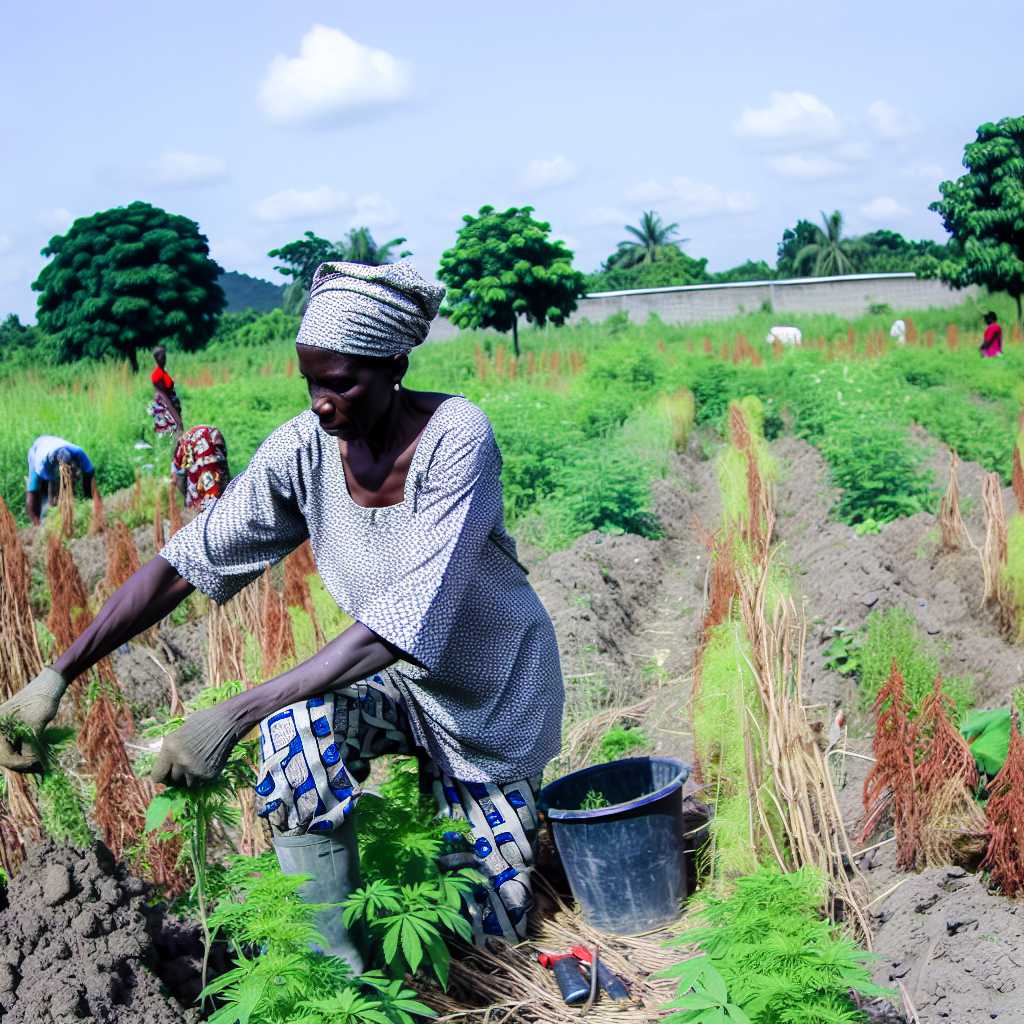Introduction:
Microfinance refers to providing financial services to low-income individuals.
Particularly, smallholder farmers in Nigeria are the focus of these services.
Smallholder farmers face challenges such as limited access to credit.
They also encounter inadequate resources and lack of financial literacy.
In this blog post, we will discuss the significance of microfinance.
We will focus on how it supports smallholder farmers.
We will highlight the obstacles they encounter.
Furthermore, we will explore potential solutions to enhance their livelihoods.
The Role of Microfinance Institutions in Nigeria:
Microfinance institutions play a vital role in providing financial services to smallholder farmers in Nigeria.
These institutions specialize in offering microloans, savings accounts, and insurance products tailored to the needs of small-scale farmers.
Benefits of Microfinance for Smallholder Farmers:
- Access to Credit: Microfinance institutions provide smallholder farmers with access to credit, allowing them to invest in their farm operations and improve productivity.
- Savings Opportunities: By offering savings accounts, microfinance institutions help farmers build financial reserves for emergencies or future investments.
- Insurance Coverage: Microfinance programs often include insurance options to protect farmers against crop failures, natural disasters, or other risks.
Examples of Successful Microfinance Programs in Nigeria:
- Grameen Foundation: This organization has been instrumental in providing microloans to smallholder farmers in Nigeria, empowering them to expand their agricultural activities.
- LAPO Microfinance Bank: LAPO has a strong presence in rural communities, offering comprehensive financial services to farmers and helping them achieve financial stability.
- Oxfam Nigeria: Oxfam’s microfinance initiatives have supported smallholder farmers by providing them with access to credit, training, and market linkages, leading to increased incomes and improved livelihoods.
Microfinance institutions play a crucial role in enabling smallholder farmers in Nigeria to overcome financial barriers and improve their agricultural productivity.
By offering tailored financial services and support, these institutions empower farmers to achieve sustainable growth and contribute to the country’s food security and economic development.
Challenges Faced by Smallholder Farmers in Nigeria:
Smallholder farmers in Nigeria face numerous challenges that significantly impact their livelihoods and hinder agricultural productivity.
Limited Access to Credit:
One of the major challenges smallholder farmers in Nigeria face is limited access to credit.
Most financial institutions are reluctant to lend to small farmers due to the perceived high risk associated with agriculture.
Lack of Financial Literacy:
Smallholder farmers often lack the necessary financial literacy to effectively manage their finances and investments.
This results in poor decision-making regarding budgeting, savings, and investment opportunities.
Vulnerability to Market Fluctuations:
Smallholder farmers are highly vulnerable to market fluctuations, which can significantly impact their income and livelihood.
Fluctuations in prices of agricultural products can lead to financial instability for farmers.
These challenges collectively contribute to the overall struggle smallholder farmers face in Nigeria to sustain their livelihoods and improve agricultural productivity.
Without access to credit, financial literacy, and protection against market fluctuations, smallholder farmers continue to face barriers in their efforts to thrive in the agricultural sector.
Uncover the Details: Community-Based Agricultural Business Models in Nigeria
Impact of Microfinance on Smallholder Farmers:
In Nigeria, microfinance has had a significant positive impact on smallholder farmers in various ways:
- Increased Income: Microfinance provides smallholder farmers with access to credit, enabling them to invest in their farms and increase their productivity.
- Improved Agricultural Practices: Through training and guidance provided by microfinance institutions, farmers can learn modern techniques and improve their yields.
- Poverty Alleviation: By providing financial services to smallholder farmers, microfinance helps lift them out of poverty and improve their living standards.
Case studies and success stories further highlight the tangible benefits of microfinance for smallholder farmers:
- Case Study 1: Mrs. Adebayo, a small-scale farmer, received a loan from a microfinance institution to purchase high-quality seeds and fertilizers. As a result, her crop yields doubled, leading to a significant increase in her income.
- Case Study 2: Mr. Ibrahim, a smallholder farmer, joined a savings group supported by a microfinance program. By regularly saving and accessing credit when needed, he was able to expand his farming operation and increase his profits.
These success stories demonstrate the transformative power of microfinance in empowering smallholder farmers and driving sustainable agricultural development in Nigeria.
Find Out More: Case Studies of Nigerian Agricultural Business Success
Government Support for Microfinance in Nigeria
Government policies and initiatives support microfinance in Nigeria.
The role of government agencies promotes financial inclusion and provides funding for microfinance institutions.
Government interventions improve access to financial services for smallholder farmers.
Government Policies and Initiatives Supporting Microfinance
In Nigeria, the government implements various policies and initiatives to support microfinance institutions.
One key policy is the National Microfinance Policy, launched to regulate and strengthen the microfinance sector.
The Central Bank of Nigeria (CBN) established the Microfinance Policy, Regulatory, and Supervisory Framework.
This framework guides the operations of microfinance institutions.
It ensures microfinance institutions comply with set standards, protecting the interests of smallholder farmers.
Role of Government Agencies in Promoting Financial Inclusion
Government agencies like the Federal Ministry of Agriculture and Rural Development play a crucial role.
They promote financial inclusion for smallholder farmers.
These agencies collaborate with microfinance institutions to provide financial literacy training.
Access to credit facilities is also a key focus.
The Nigerian Incentive-Based Risk Sharing System for Agricultural Lending (NIRSAL) supports smallholder farmers.
NIRSAL provides credit guarantees to encourage financial institutions to lend.
Transform Your Career with Expert Guidance
Get personalized mentorship consulting that’s tailored to your unique path. Our expert advice is actionable and exclusive.
Get StartedProviding Funding for Microfinance Institutions
The government provides funding for microfinance institutions through various initiatives.
One initiative is the Agricultural Credit Guarantee Scheme Fund (ACGSF).
This fund guarantees loans granted by financial institutions to smallholder farmers.
It helps reduce risk and encourages lending.
The Bank of Agriculture (BOA) also provides funding to microfinance institutions.
This funding allows on-lending to smallholder farmers at low-interest rates.
It helps microfinance institutions reach more farmers and improve their agricultural practices.
Evaluating the Effectiveness of Government Interventions
Government interventions positively impact access to financial services for smallholder farmers in Nigeria.
Implemented policies increase the availability of credit and financial literacy training.
Collaboration between government agencies and microfinance institutions boosts credit access.
This enables farmers to invest in their agricultural activities.
Investments lead to increased productivity and income levels for farmers.
Government support for microfinance is instrumental in promoting financial inclusion.
It also improves the livelihoods of smallholder farmers.
Continued collaboration is essential for sustaining positive outcomes in the future.
Uncover the Details: Utilizing Data Analytics in Nigerian Agricultural Business

Opportunities for Collaboration between Microfinance Institutions and Smallholder Farmers:
Highlight potential opportunities for collaboration between microfinance institutions and smallholder farmers.
Discuss how partnerships can leverage resources, strengthen capacity, and enhance sustainability in the agricultural sector.
Provide examples of successful collaborations between microfinance institutions and smallholder farmers in Nigeria.
Potential Opportunities for Collaboration:
Access to Finance: Microfinance institutions can provide smallholder farmers with much-needed access to credit and financial services to expand their operations.
Technical Assistance: Collaborations can involve training programs and workshops to improve farmers’ skills and knowledge in modern agricultural practices.
Market Linkages: Microfinance institutions can help smallholder farmers connect with markets, ensuring a steady demand for their produce.
Benefits of Partnerships:
Resource Leveraging: By working together, microfinance institutions and smallholder farmers can pool their resources to achieve mutual goals.
Capacity Building: Partnerships can help build the capacity of farmers to enhance productivity, leading to increased income and sustainability.
Risk Mitigation: Collaborations can help mitigate risks for both parties, allowing for more stable business operations in the long run.
Successful Collaborations in Nigeria:
Oxfam Nigeria: Oxfam has partnered with microfinance institutions to provide financial literacy and business training to smallholder farmers in rural areas.
NIRSAL: The Nigeria Incentive-Based Risk Sharing System for Agricultural Lending (NIRSAL) collaborates with microfinance institutions to provide credit guarantees to farmers.
Babban Gona: This social enterprise partners with microfinance institutions to offer credit facilities and training to smallholder farmers, leading to increased yields and incomes.
See Related Content: Innovations in Nigeria’s Agricultural Business Sector
Tailoring Programs to Smallholder Farmers’ Needs
Understand the specific challenges and opportunities faced by smallholder farmers in Nigeria.
Customize microfinance products and services to meet the unique needs of smallholder farmers.
Offer flexible repayment terms and collateral requirements to accommodate farmers’ cash flow.
Importance of Financial Education
Provide financial literacy training to smallholder farmers to improve their understanding of financial concepts.
Empower farmers to make informed decisions about borrowing, saving, and investing in their agricultural activities.
Help farmers develop budgeting and financial management skills to enhance their livelihoods.
Sustainable Lending Practices
Ensure responsible lending practices to prevent over-indebtedness among smallholder farmers.
Conduct thorough assessments of farmers’ creditworthiness and repayment capacity before disbursing loans.
Cap interest rates and fees to protect farmers from predatory lending practices.
Monitoring and Evaluation Mechanisms
Establish robust monitoring and evaluation systems to track the performance and impact of microfinance programs.
Regularly collect data on farmers’ loan utilization, repayment patterns, and agricultural productivity improvements.
Analyze findings to identify areas for improvement and adjust program strategies accordingly.
Ensuring Success and Impact
Engage with local communities, farmer groups, and agricultural cooperatives to build trust and promote financial inclusion.
Collaborate with local NGOs, government agencies, and microfinance institutions to leverage resources and expertise.
Continuously adapt and innovate microfinance approaches based on feedback from farmers and stakeholders.
By following these best practices, microfinance programs can effectively support smallholder farmers in Nigeria, improve their livelihoods, and contribute to sustainable agricultural development in rural communities.
Microfinance and Smallholder Farmers in Nigeria
Microfinance plays a crucial role in supporting smallholder farmers in Nigeria.
It provides them with financial resources to invest in their farms.
This financial support improves their livelihoods significantly.
Farmers can access credit, savings, and insurance services.
These services are essential for their agricultural activities.
Moreover, microfinance contributes to sustainable agricultural development in Nigeria.
It promotes productivity, increases income levels, and reduces poverty.
Additionally, it empowers farmers to adopt modern farming techniques.
Access to quality inputs and expanded market networks is also facilitated.
Encouraging further exploration of microfinance opportunities is imperative.
By expanding these services, more farmers can benefit.
This support enhances their farming operations.
Ultimately, this contributes to the overall development of the agricultural sector in Nigeria.
Additional Resources
Agriculture Overview: Development news, research, data | World Bank
“Microfinance credit and micro enterprise development in the …




